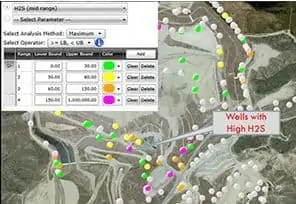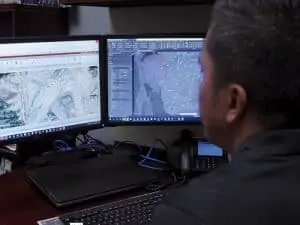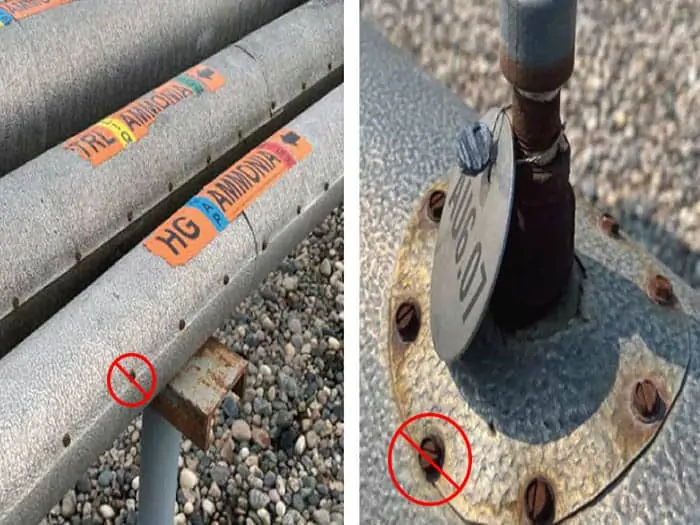

Revenue from the Fall Classic goes to their mission, funding scholarships for students and solid waste research to advance sustainable waste management.
Please join us in sponsoring or attending this fantastic networking event for a good cause.
Visit the EREF event page to learn more about the event and safety measures in place!
In an environmentally safe, less costly, and efficient manner, the disposal and recycling of millions of gallons of production water (brine water) and flowback water generated from the oil and gas industry annually continue to be challenging. While new technologies are on the horizon, there remains a long road ahead to their implementation.
In his article in Geosynthetic News, Neil Nowak writes in detail about three sites in Wyoming, Utah, and Texas that are evaporating or recycling water in geomembrane-lined ponds. Nowak’s article demonstrates the successful use of black high-density polyethylene (HDPE) liners to increase evaporation over clay or unlined ponds and using a white liner to reduce evaporation relative to a black liner.
Each project has been operational for several years; they continue to expand under their permits. Nowak takes us through a combination of favorable factors to the evaporative process, including the natural characteristics of each sites’ climate and the business and environmental goals.
The projects are interesting in that each facility provides oil and gas production companies in the area with a large commercial alternative to production water and flowback disposal versus numerous small ponds or disposal via injection wells.
About the Author: 
Mr. Nowak has managed environmental compliance, evaporation pond design and permitting, and construction quality assurance activities across the Southwest. As a land-use planner and Environmental Engineer, he explains how various environmental technologies work under specific conditions to companies and the public. Often he is called to public comment meetings and county commissioner meetings, where he prepares and presents project details for review and approval. He works closely with local, state, and federal regulatory agencies to ensure that the engineering and construction of sites comply with all current applicable requirements.
Hydrogen sulfide (H2S) levels are creeping up at some landfills, especially those that take C&D waste; some are seeing concentrations in the thousands to 30,000 parts per million (up from about 20 to 40 ppm ten years ago). And even at very low concentrations, H2S can be problematic.
Material Recovery Facility residuals, which typically contain significant amounts of pulverized drywall, are high in gypsum and sulfate. Once broken down, residuals become a high-surface-area material, leaching into and spreading through waste. When reacting with water and organics, it can potentially generate H2S. With a drive to divert more C&D debris, and regulations tightening around H2S, operators’ jobs get harder as they work to stave off emissions from this corrosive, flammable compound notorious for its “rotten egg” odor.
When building out their gas collection systems, controlling H2S becomes even more daunting. Sol Sim, an SCS Engineers Vice President, explains, “We see H2S concentrations jump when we expand landfill gas collection systems, often in cells that contain C&D residual screening materials. The gas was there all along but sequestered. Now it’s coming out of the ground, and the onset of issues can spike suddenly.”

When spikes come on quickly, Sim’s team implements turnkey interim treatment approaches. They start by identifying the gas collection wells with the highest contributors and act fast to get them into compliance.
SCS teams take a two-pronged approach by stepping back and thinking about the big picture while taking action. It provides a major advantage to moving too quickly.
The more data, the better. Your engineers can simulate treatment with various media to assess the impact on flare inlet concentrations. And knowing potential impact at the flare is critical; it’s the compliance point where regulators measure sulfur dioxide (SO2) emissions.
SO2 can’t be controlled through combustion, so removing H2S from waste before sending gas to the flare is essential. Sim thinks back to problems he’s investigated for clients who had SO2 sneak up on them, causing failed sulfur dioxide emissions testing.
The proactive measure of identifying problematic gas wells and treating them is key to staying in compliance. And Sim often finds clients using interim solutions as long as they can. He has seen them work well for up to five years but they don’t resolve operators’ long-term issues, which will become more challenging as our waste streams continue to change or as landfills continue to accept more and more C&D materials.

“We’re going to investigate thoroughly to pinpoint and understand the cause, but we do take immediate action in the interim. As part of the solution, we’ll develop an informed strategy to prevent issues well into the future,” he says.
For the longer haul, it takes time to get building permits. Coming up with permanent engineering designs and treatments requires a lot of troubleshooting and research. Even once engineers identify a lasting fix, it takes time to manufacture and install larger vessels and other infrastructure.
But they don’t wait for all these pieces to come together to act.
The priority is getting operators in compliance right away or taking down emissions if they are on the verge of noncompliance. As work begins, operators can breathe a little easier knowing they have time to figure out how to allocate resources and funds to implement a more permanent strategy.
“We’ve seen where data we’ve gathered while working on the immediate problem enables our clients to gain insight to make good decisions around rightsizing their infrastructure moving forward,” Sim says.
Watch and study while addressing the immediate problem.
Sim emphasizes that operators should not be surprised or act too quickly when they turn on the gas extraction system and see spikes in H2S concentrations. There is usually an initial spike from a new high H2S producing area at the onset of gas collection. He has seen operators abruptly stop extracting, which can lead to odors or other compliance issues.
“When you put in a treatment system, you can take out the initial surge in H2S to allow time for the concentrations to level out. It’s important to allow that window for initial surges to run their course to understand the problem better. Otherwise, you could over-design your system around a short-term event,” Sim advises.
He points to a real-life scenario: a site that skipped the interim step of starting with a less expensive initial solution. Once they started drawing on the gas, they realized the problem was not as substantial as originally thought, and they didn’t need a multi-million-dollar system in the end.
A balancing act.
“Imagine H2S generation as an expanding balloon; if you pop it, air rushes out fast [akin to when you first pull gas from the ground]. That concentration level scares people. But if you react by shutting off extraction points, your balloon will continue to expand and eventually create odor problems. The goal is to extract the gas and H2S at the rate it is being generated, so it’s a balancing act, where expertise and technology both play key roles,” Sim says.
Early work typically begins by identifying wells that are the highest contributors and concentrating efforts there. It’s a complex process as sites can have fifty to thousands of collection points. Having the historical data and saving the data to watch the trend makes identifying and analyzing specific wells or clusters much more efficient.
Successfully attacking those high offenders requires an understanding of flow and concentrations. After locating the problem area, Sim takes samples using Dräger tubes at strategic points throughout individual wells and headers to identify concentrations. Gas well monitoring and the corresponding flow data will tell you if you’ve taken emissions down sufficiently.
More Resources:
SCSeTools Landfill Data Monitoring and Analysis
Staying Ahead of Odor Management at Solid Waste Facilities
On September 15, Governor Pritzker signed Senate Bill 2408, forming the Illinois Energy Transition Act. The Act advances renewable energy goals and the path to carbon-free electricity generation by 2045. To say this bill will impact the Illinois electrical utility landscape is an understatement.
Illinois is a top energy producer and consumer in the upper Midwest. The Act requires displacement of more than 6,000 MWh provided from coal and natural gas. One average MWh is enough to power 796 homes for a year in the U.S.
Energy efficiencies and implementing alternative energy resources will be an increasingly important strategy to mitigate the cost impacts from this Act to all users: residential, commercial, industrial, and municipal.
SCS supports clients with the decommissioning and legacy management of coal-fired facilities and renewable energy development. Our environmental team in Illinois includes local experts, Scott Knoepke and Richard Southorn who support the management of coal-fired facilities with Coal Combustion Residuals (CCR) and assist utilities transitioning to renewable natural gas installments and solar energy sources. For coal-fired facilities with CCR impoundments, SCS’s Illinois Office provides design, closure, construction quality assurance, and site stewardship (e.g., long-term maintenance, groundwater monitoring, and reporting).
SCS uses a specialized team for solar implementation on landfills and Brownfields. Knoepke and Southorn are supported by SCS National Experts in the region to assess and implement Solar Energy on Landfills & Brownfields.
The Act defines that landfill gas produced in Illinois as a renewable energy resource. SCS Engineers has one of the longest and most successful Biogas practices in the United States. SCS designs, constructs, and operates more Biogas, Anaerobic Digestion, Renewable Natural Gas, Ag Digester systems than any other engineering firm in the nation. Our clients attribute our quality and high production rates to our practice specializing in waste gas utilization, combined with our expertise in solid waste management and compliance.
New Chicago office location at 40 Shuman Boulevard, Suite 216, Naperville, IL 60563
SCS Engineers continues expanding its environmental team in its Chicago, Illinois office to meet environmental engineering and consulting needs focusing on waste management and the needs of the electric utilities. Driving demands are industries and municipalities seeking to reduce their environmental footprint while providing essential services and products.

Meet the Crew!

Brett Miller is a Senior Designer with over 20 years of experience and proficiency in AutoCAD Civil 3D and Maya. Brett is capable of any production drafting and is highly skilled in understanding 3D space. This helps him support designs that fit into site-specific, real-world environments. Brett also creates 3D models and animations that illustrate the benefits of a design to our clients.
Niko Villanueva, PE, joins SCS with eight years of experience. Niko provides engineering and drafting support and is experienced in designing various landfill systems such as stormwater management, leachate and gas control, and foundation analysis. He has also prepared cost estimates and construction bid quantities for various projects and construction quality assurance services at multiple facilities.


Recently the state of Wisconsin released its updated 2020-2021 statewide waste characterization study. The study found that the broad organics category, including yard waste and diapers, accounted for about 1.3 million tons. An estimated 924,900 tons of paper, including cardboard, compostable and office paper, comprised about 21 percent of the landfills’ tonnage. That was followed by plastic at about 17 percent or 745,600 tons.
You can read the study, but why do local governments, states, and waste management businesses request these studies? Because waste and landfills are expensive to manage. Diverting waste from landfills cuts greenhouse gases and supplies materials for reuse as new products or compost – a more sustainable system.
Waste characterization information is designed for solid waste planning; however, anyone interested in the characteristics of the solid waste stream may find it useful. Studies can also target specific waste or needs such as construction and demolition waste and business waste generators. A generator means a person, specific location, or business that creates waste.
These studies help start answering questions such as:
States, jurisdictions, citizens, and businesses can use this information as a planning tool to help meet state mandates and their goals to reduce waste and achieve the benefits of sustainable practices. Kudos to Wisconsin, Iowa, and California, several of the many states moving toward more circular waste management!
As the world faces environmental, social, and economic challenges, environmental education can transform lives and society by addressing these challenges. SCS’s Young Professionals Planning Committee collected $3,683 for the NAAEE – North American Association for Environmental Education this summer.
SCSers generously contributed toward funding scholarships, research, outreach focusing on K-12 programs, justice, and diversity programs. SCS Corporate matches employee donations for a total of $7,366 raised for NAAEE.
Education and association participation play an important part in SCS’s mission to promote a sustainable environment through innovation and the creative application of technology and management strategies.
Most everyone is familiar with IIAR2, the American National Standard for Safe Design of Closed-Circuit Ammonia Refrigeration Systems. They will refer to it as the Recognized and Generally Accepted Good Engineering Practice (RAGAGEP) for our industry.
People often forget that IIAR2 is merely the RAGAGEP for the design of ammonia refrigeration systems, but not the installation. IIAR4-2020 is the current RAGAGEP for the installation of ammonia refrigeration systems. If we look through IIAR4, we find that it does, in fact, prohibit the practice of using sheet metal screws when installing insulation.
Section 8.1.11 states, “Screws, rivets, or any other jacket securement device that could pierce the underlying vapor retarder shall not be used. Only bands and seals shall be used to secure the jacketing.”

SCS Engineers proudly sponsors the 2021-2022 California State University Long Beach (CSULB) NASA RMC team: The Space Sharks, participating in NASA’s upcoming LUNABOTIC competition. The annual NASA LUNABOTICS competition is a hands-on engineering exercise where students receive practical experience in the full engineering lifecycle process from concept development to system closeout.
This Artemis Student Challenge trains university students in the methods of NASA systems engineering while designing, building, and operating an exciting lunar excavator prototype. The Space Sharks are composed of passionate students from mechanical engineering, electrical engineering, and computer science. They are a collaborative team of students from all disciplines and grade levels working towards the ultimate goal of achieving first place in the NASA Lunabotics Competition. The goal is for each member to work in a team setting to design, build, and execute a shopping-cart-sized rover.
According to NASA, rovers need to be compact, lightweight, and rugged to launch with minimum cost but withstand the rigors of terrestrial mining operations in difficult-to-reach or dangerous locations. NASA desires excavation in future space missions for In Situ Resource Utilization (ISRU) to make local commodities, such as propellants and breathing air, and pursue construction operations on the Moon, Mars, an asteroid, or a comet in the future.
Over nine months, Space Sharks will go through the engineering processes to design, build, and test a robot rover that can mine for regolith autonomously. It will be necessary to excavate lunar regolith to extract local resources, maintaining a sustainable presence on the Moon, so they don’t have to be transported from Earth through its deep gravity well.
Check out their efforts here: Teaser Video 2020/2021 – YouTube
Website: https://beachrmc.com/
Instagram: https://www.instagram.com/csulb.rmc/
In August, the U.S. Department of Energy (DOE) announced nearly $34 million in funding for 11 projects that will support high-impact research and development to improve and produce biofuels, biopower, and bioproducts. These biomass resources, otherwise known as feedstocks, can be produced by municipal solid waste (MSW) streams and algae and converted into low-carbon fuels that can significantly contribute to the decarbonization of transportation sectors that face barriers to electrification, like aviation and marine.
Transportation accounts for approximately 30% of total U.S. energy consumption and generates the largest share of the country’s greenhouse gas emissions. Biofuels serve as a low-carbon alternative to petroleum and can also be used to produce carbon-heavy products like plastics, fertilizers, lubricants, and industrial chemicals.
Among the DOE recipients is a team led by Stephanie Lansing, professor in the Department of Environmental Science and Technology at the University of Maryland (UMD). Lansing is leading a consortium of scientists and industry partners to research innovative ways to use waste and to make value-added products that will contribute to the sustainability of our economy and planet.
SCS Engineers is an environmental engineering firm specializing in waste management and renewable energy from waste products. SCS is on the Lansing team focusing on biofuel production. The team includes Ohio State University, Mississippi State University, Virginia Tech, Idaho National Lab, and Quasar Energy Group. Their first task is to conduct a waste characterization study across every U.S. region during every season of the year, to understand how location and the time of year affect landfills’ incoming waste. The results help determine what the biofuel potential of that waste is.
Another Lansing team will be working toward producing bioplastics that are made without using fossil fuels and degrade much more easily than current plastic products.
The biofuel and bioplastic projects involve sustainability and economic assessments comparing them to current products on the market to see how marketable these new products can be. And the reason why Lansing’s comprehensive teams are important; they will help commercialize any new products.
Secretary of Energy Jennifer Granholm stated in the DOE August 3 press release, “The companies and universities leading these projects will ensure that our cutting-edge biofuel technologies reduce carbon emissions, create new jobs up and down the supply chain, and are made in America by American workers.”
More information about Solid Waste Management and Biofuels.